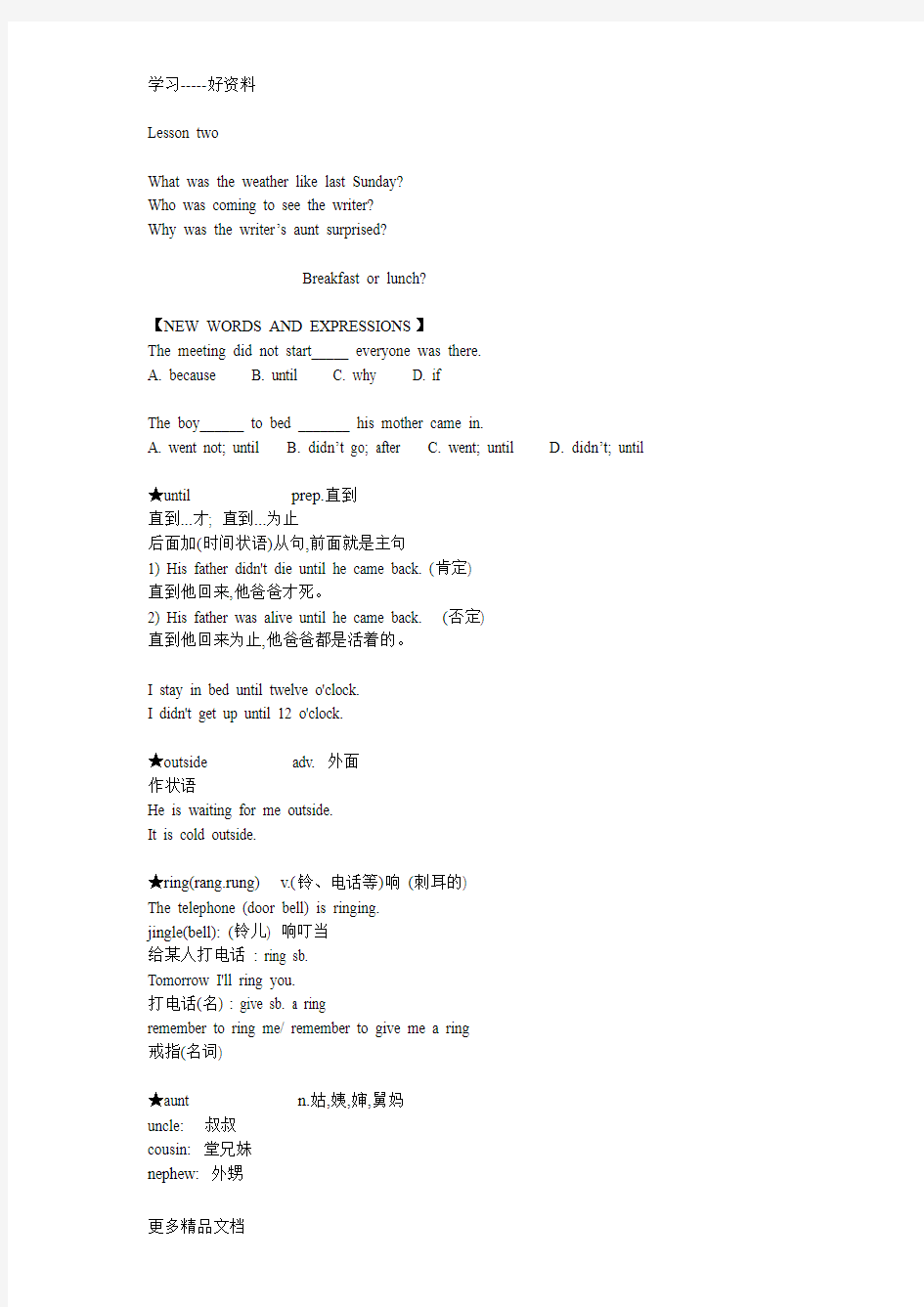
新概念英语第二册第二课最全讲义汇编
- 格式:doc
- 大小:20.00 KB
- 文档页数:4


Lesson two
What was the weather like last Sunday?
Who was coming to see the writer?
Why was the writer’s aunt surprised?
Breakfast or lunch?
【NEW WORDS AND EXPRESSIONS】
The meeting did not start_____ everyone was there.
A. because
B. until
C. why
D. if
The boy______ to bed _______ his mother came in.
A. went not; until
B. didn’t go; after
C. went; until
D. didn’t; until
★until prep.直到
直到...才; 直到...为止
后面加(时间状语)从句,前面就是主句
1) His father didn't die until he came back. (肯定)
直到他回来,他爸爸才死。
2) His father was alive until he came back. (否定)
直到他回来为止,他爸爸都是活着的。
I stay in bed until twelve o'clock.
I didn't get up until 12 o'clock.
★outside adv. 外面
作状语
He is waiting for me outside.
It is cold outside.
★ring(rang.rung) v.(铃、电话等)响(刺耳的)
The telephone (door bell) is ringing.
jingle(bell): (铃儿) 响叮当
给某人打电话: ring sb.
Tomorrow I'll ring you.
打电话(名) : give sb. a ring
remember to ring me/ remember to give me a ring
戒指(名词)
★aunt n.姑,姨,婶,舅妈
uncle: 叔叔
cousin: 堂兄妹
nephew: 外甥
niece: 外甥女
★repeat v.重复
【TEXT】
It was Sunday. I never get up early on Sundays. I sometimes stay in bed until lunchtime. Last Sunday I got up very late. I looked out of the window. It was dark outside. 'What a day!' I thought. 'It's raining again.' Just then, the telephone rang. It was my aunt Lucy. 'I've just arrived by train,' she said. 'I'm coming to see you.'
'But I'm still having breakfast,' I said.
'What are you doing?' she asked.
'I'm having breakfast,' I repeated.
'Dear me,' she said. 'Do you always get up so late? It's one o'clock!'
New words and expressions 生词和短语
until prep. 直到
outside adv. 外面
ring v. (铃、电话等)响
aunt n. 姑,姨,婶,舅母
repeat v. 重复
【课文讲解】
On Sundays: 所有的星期天,每逢星期天
never: 从来不(可以直接用在动词前面)
=not (变成否定句,前面一定要加助动词)
I don't like her.=I never like her.
因为是上个星期,所以时态不是一般现在时。
look out of :朝窗外看
从...里:from, out of
dark: 天很黑
What a day?
What + a + n.——感叹句
It is terrible day.==> What a terrible day!
What+a/an (+a.)+n.(+主语+谓语)
What a terrible day!
What a good girl (she is)!
What a day!
有上下文和一定的语境,才能省略形容词。
just then: 就在那时
如果不知道对方性别,可以用it取代
Who are you?/Who is it ?
just只会出现在"现在完成时"
by train
by 直接加交通工具(不能有任何修饰词,复数)
I go out by bus/on two buses.
如果加修饰词,就要换掉by
I'm coming to see you. 我将要来看你。
用come 的现在进行时态be coming 表示一般将来
Dear me:天哪
My god!
My dear!
【Key structures】关键句型
Now, often and Always 表示现在和经常发生的动作
Now——现在进行时(说话的当时正在发生,现阶段正在发生)
Often ad Always——一般现在时
"现阶段"
I am working as a teacher.
I do.../he does...
I get up...
一般现在时,是一种习惯,真理,是过去,现在和未来都会发生的事情。
现在还在睡觉
He is still sleeping.
频率副词往往放在句子中间,实义动词前,非实义动词后
非实义动词:1.系动词(be)
2.助动词帮助动词构成时态的(do, does, will, shall, have, had, has)
3.情态动词:(must, can, may)
I’m never late for appointments.
Sometimes he tells us jokes.
We often meet at that coffee shop.
She is always nice and friendly to people.
Are you still working?
I seldom watch TV.
An early bird catches the worm.
英国的早餐